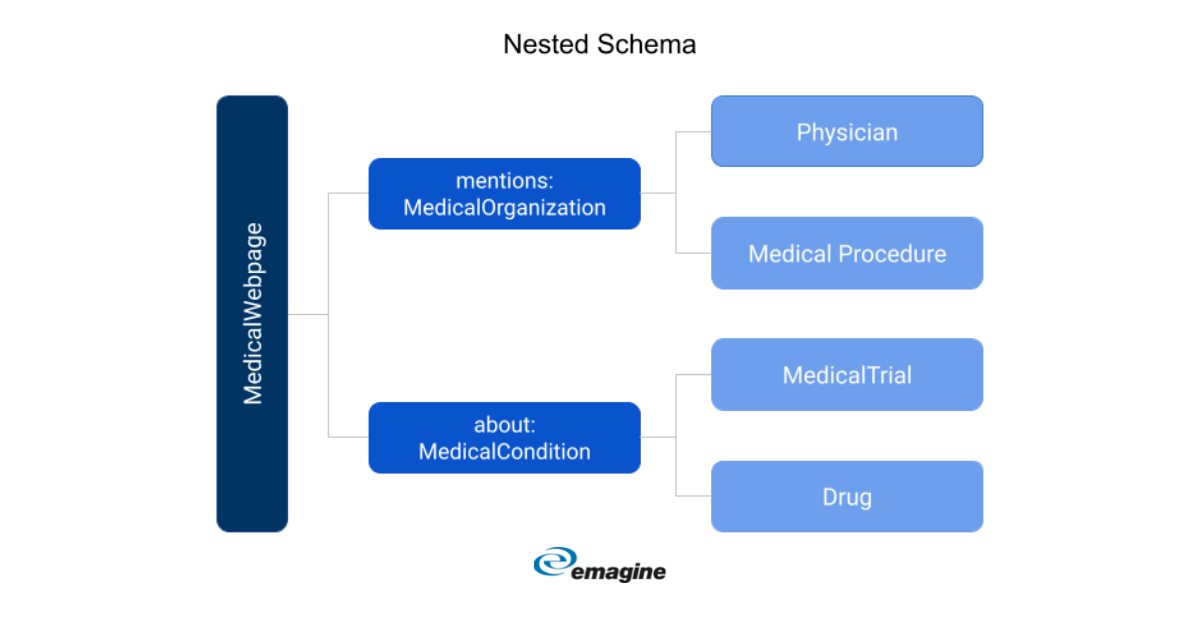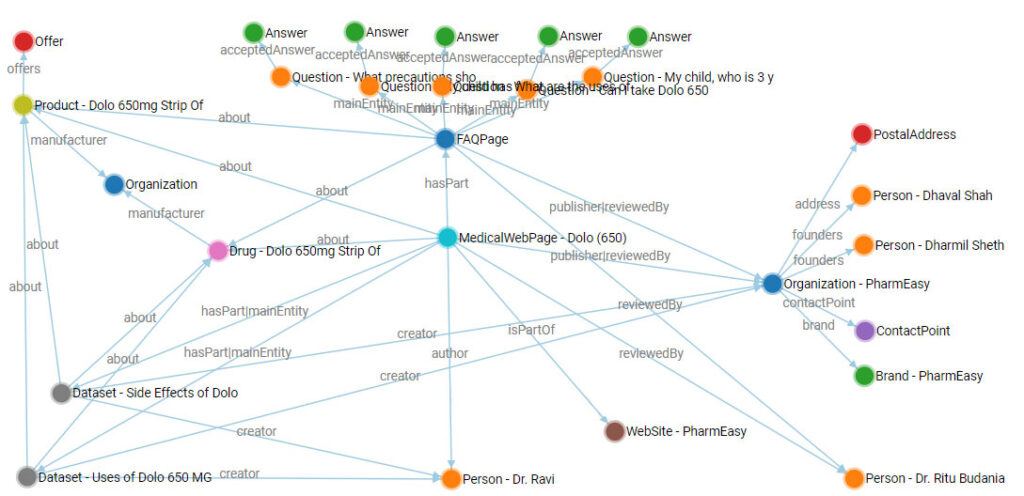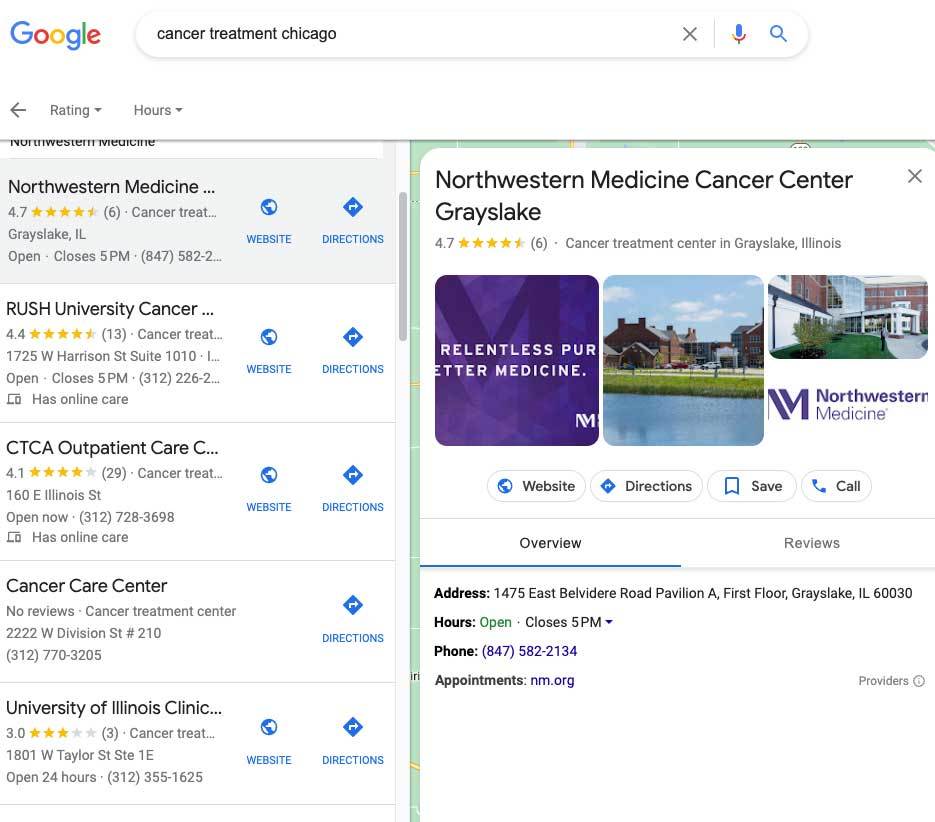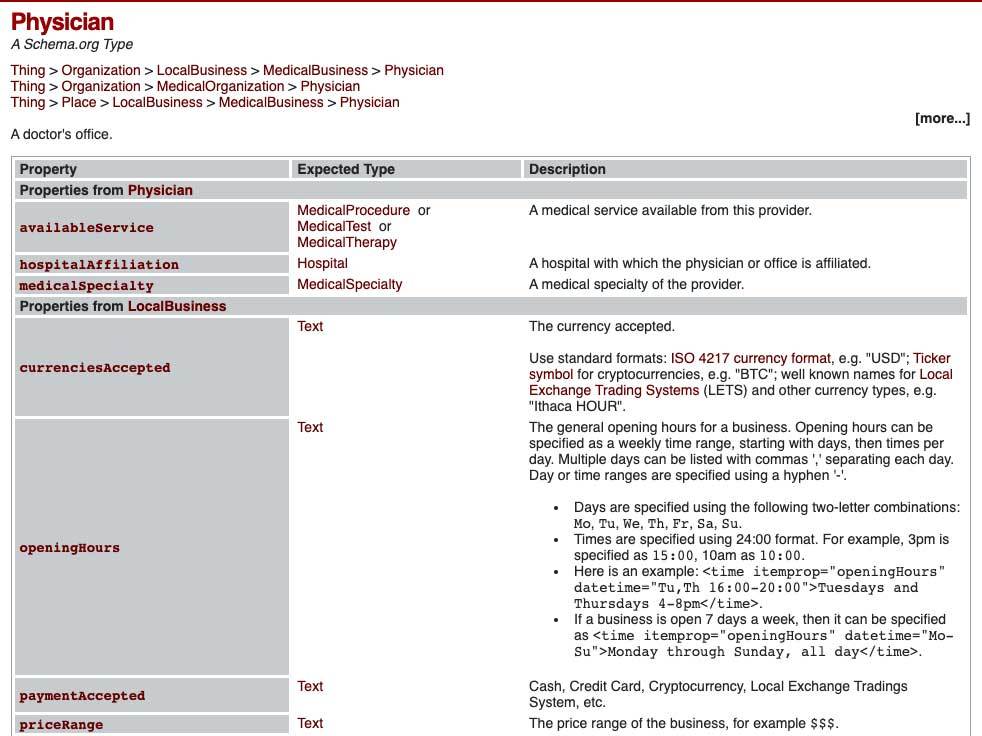Schema Markup for SEO: How to Use Medical Schema for Pharmaceutical Products

What Is Structured Data Markup or Schema?
Json LD Schema is structured data that is implemented into the code of a website that helps inform search engines, like Google, about the connections between entities. Structured data, a form of microdata, is an important element of an SEO strategy for all online businesses, and is often under-utilized. Schema markup for SEO helps search engines better understand the information on your website and recognize the meaning and relationships behind entities.
While there are three languages of code that you can add to your website to help search engines make these entity connections (JSON-LD, microdata and RDFa), this article will concentrate on JSON-LD makeup as it is Google’s recommended structured data method.
Schema markup is especially important for the healthcare industry and ecommerce sites because it allows websites to gain rich snippets that include rating stars, product availability and pricing information, as well as featured snippets like reviews, numbered lists, FAQs, or how-to snippets. Schema markup is also used to fuel voice search, making it an important player in future SEO strategy as well.
What’s the Difference?
Schema Markup
- Schema markup is a shared language platform that is a collaboration of Google and other search engines designed to provide a standardized markup language that can be read by search engines.
Structured Data
- Structured data is the actual data that you provide within the schema markup language. This data describes the actual content on your website. This input helps search engines understand your site.
Rich Results
- Rich results, sometimes called rich snippets, are the results in the search engine results pages that are visually enhanced and use the data provided by schema markup.
How Markup with Nested Schema Works
A nested schema is exactly what it sounds like – a schema markup that contains other schema markups within it. This allows for the organization and structuring of data in a hierarchical order and makes the data easier for search engines to understand and query.
So for example, if you wanted to tell search engines that your web page is talking about a new drug in clinical trials, you would start with a schema markup that describes the web page and website. This structured data could connect the organization to the page and use sameAs properties to link the company’s social media pages.
You would then use other structured data connectors like about or mainEntitity to link the content of the web page to the clinical trial being conducted.
Nested within that schema markup, you could use connectors to outline the basic therapeutic areas the drug is focused on through MedicalCondition schema markup, as well as other potential medical treatments for the therapeutic areas.
Other names of the disease can be nested to the schema markup through Differential Diagnosis and again, the sameAs property can be used in multiple areas to make connections to entities that are well-known for the disease.

The possibilities for structure data are only limited by the content on the page, and nesting is a great way to inform search engines of how a new drug or clinical trial is related to known entities.
How Schema Markup Helps Your Healthcare Website Improve Visibility in Search Engines?
According to Google, “Rich results are experiences on Google Search that go beyond the standard blue link. They’re powered by structured data and can include carousels, images, or other non-textual elements.” These visually enhanced results can inform and entice users to click through to your website.
Milestone Research found that users click on rich results 58% of the time. Previous research from Backlinko has found that the #1 position in Google’s organic search results has an average CTR of 27.6%. So rich results can almost double organic click through rates for search terms.
Adding structured data to your SEO and content strategy is one way to help your healthcare organization stand out in search results. Schema.org is a catalog of this schema markup that contains over 200 types and 160 properties that are specifically designed for the healthcare industry.
Structured data can be used to highlight a variety of different health entities including:
- MedicalOrganization
- MedicalClinic
- Physician
- MedicalCondition
- MedicalDevice
- MedicalTrial
- MedicalTherapy
Schema markup fuels rich results and nesting reviews, medical conditions, and hospital affiliation can help your Physician markup stand out from the rest of the search engine result pages and increase click through rate. MedicalCode is an especially useful nested schema markup to help designate the ICD-10 code for particular diseases to make a physician’s specialties clear or designate the study area for a clinical trial.

What Rich Results Does Schema Markup Inform in Google?
Schema markup can fuel results for FAQs, videos, articles, breadcrumbs, events, fact checks, reviews, and Q&As. Each type of rich result requires a different schema markup to generate the result, and just because the schema markup is included on your page doesn’t mean you will get the rich result in the SERPs. Without schema markup though, there is no chance of rich results.
Carousel results including those for recipes, courses, restaurants and movies are driven by structured data.
Many job-related rich results including job postings, estimated salary and EmployerAggregateRating are all powered by rich results. The data for each of these can help inform potential candidates of available jobs at your healthcare organization.
For a full list of Google’s potential rich results, visit Google Search Central.
What Other Ways do Search Engines use Schema?
In addition schema markup helps search engines make connections between entities which can then help inform the Knowledge Graph for that entity. Google’s Knowledge Graph is really a collection of known information using controlled vocabulary from one or more pages to define an entity.
Adding structured data to your website and connecting the site to other well-known entities is one way to help Google and other search engines make those connections and thus, fuel your Knowledge Panel.
In addition, schema markup gives your webpage multiple opportunities to show up in the search engine results pages. For example, your site could show up simultaneously as an organic result, as an answer to an FAQ, and as a video on the same results page.
This presents multiple chances for a user to click on your site, all from one search page.

How Does Schema Markup and Content Marketing Work Hand-in-Hand for SEO?
Content marketing involves creating and distributing valuable, relevant and consistent content to attract and retain an audience. Content marketing is a strategic approach to digital marketing that works best when informed by a solid SEO strategy that incorporates long-tail keywords with relevant intent and strategic search volume.
Perhaps nowhere is content marketing more important than in the healthcare industry. Even before the advent of COVID and the wealth of unresearched and unvalidated data that was being circulated on the internet, the healthcare industry has always been subject to misinformation. Recent Google updates that have imposed stricter guidelines on Your Money, Your Life sites have greatly impacted search and the healthcare industry.
Modern-day healthcare consumers want to more fully understand their health conditions, and the treatment options available. They also want to hear from other consumers about their experiences with physicians, clinical trials, and even drug products. This presents a myriad of opportunities for marketing-savvy companies who are willing to share clinical research and data.
- Keyword research into common questions about therapeutic areas could fuel an FAQ page that then uses schema markup to create rich results.
- Schema markup that connects therapeutic areas to clinical trials can be invaluable in helping to link new treatment options to well-known diseases.
- Rating and review data can be linked directly to physicians to help patients better understand the quality of care that they can expect and if a physician specializes in their particular medical condition.
The underlying structured data markup can be a pivotal portion of the overall SEO and digital marketing strategy, capitalizing on reaching consumers with relevant information that is told in a more authentic and engaging way.
Inbound marketing strategy that feels more natural is surpassing traditional outbound marketing that more and more consumers are viewing as interruptive and unwanted. SEO, content and structured data markup are vital components to the new inbound digital marketing strategy.
What Schema Markup Types from schema.org Are Important to Include for the Healthcare Industry?
According to research by the HTTP Archive, the usage of Structured Data has increased in 2022, in comparison to 2021. Of the websites they surveyed, they found that the use of JSON-LD on homepages increased from 34% in 2021 to 37% in 2022 on mobile devices. Google now has over 32 rich result opportunities that are fueled by structured data.
In 2020, there were several major updates related to the healthcare industry that were rolled out for schema, including SpecialAnnouncement. The White House adopted schema.org markup for COVID-19 announcements and asked the private sector, state and local governments to do the same. This places a new level of importance on the use of structured data for healthcare. This importance was further emphasized as new types and properties for the healthcare industry were rolled out in 2020 – 2021.
In September 2022, Google made important changes to the Merchant Listing Experience that are now fueled by adding product structured data to web pages. As part of this restructuring, Google also added more recommended and required structured data properties to the Product markup such as offers, colors, size, etc. This Product schema markup can be incorporated into pharmaceutical websites to give consumers vital information about the drugs and medicines they take.
Schema App recommends FAQPage, Product and Reviews for healthcare schema markup. Other industries have also seen positive results from eye-catching rich results like Aggregate Ratings, Videos and HowTo. Ultimately, the best structured data to incorporate on your site depends on the type of content on your pages and the user intent as they search for your pages.

How to Create an SEO Strategy for Structured Data
SEO, or search engine optimization, is the process of improving your site to increase its visibility when people search for products or services related to your business in Google, Bing, and other search engines. The goal of SEO is to increase visibility in search results to attract prospective and existing customers to your business.
While SEO strategy has to take search engines into consideration, the primary objective in all SEO decisions is how to best deliver the appropriate content to users. Keeping this primary objective in mind, when outlining an SEO structured data strategy is paramount to success.
Since a site’s SEO strategy should focus first on how to deliver value to the end user, whether that user be a consumer, a healthcare provider, or even investors, schema markup is a natural extension of that goal. Schema markup clarifies relationships, adds visual interest to the SERPs, and helps organize information for Google and other search engines.
Familiarize yourself with the schema markup options by looking over the full list of item types currently available in Google and critically consider what would be helpful for marketing your business. The structured data used by your business and SERP competitors should guide your decisions.

Tools like SEMRush can further help your SEO strategy by identifying keywords where rich results, video results, FAQ pages, and other featured snippets are readily available. This can help you readily identify missed marketing opportunities where schema markup can play a pivotal role.
Planning Your Markup – The First Step In Success
Planning your website’s schema markup is the first step to a successful SEO strategy for structured data. Identify each page of your website that needs structured data implementation. Then, outline the mainEntity of each page as well as any other medical schema markup that are mentioned on the page.
Review the properties available for each data type on schema.org and confirm the information is on your web page.
Consider adding relevant digital content to the page so that it can be included in the schema markup. Use this information to create a basic outline of the schema markup to incorporate on page and determine how to nest your structured data.
Strategize the connections you can make in the schema markup to other well-known entities using the appropriate structured data connectors (sameAs, about and mentions). This will improve the strength of connections to information and entities that you send Google.
Test your schema markup to ensure that the information you provide is eligible for rich results in Google’s Rich Results Test tool.
Finally, measure and track your results. Check Google Analytics for the before and after results of optimization, and SEMRush to check for any changes to the rich results.
Typically, it’s a good idea to markup your homepage as either an Organization or a subtype that’s more specific to the healthcare industry in addition to a MedicalWebPage. Some examples include MedicalOrganization, MedicalBusiness, MedicalClinic, and Physician.
In addition, strategize which schema markups could have the most impact on your business. Adding in Product schema could qualify you for product snippets, but also requires pricing information in the form of Offers schema. Physician schema could qualify you for rich snippets like reviews, however, if the majority of reviews are negative, then that could impact your click through rate.

Just like it is a good idea to diversify your SEO strategy, the same holds true for your schema markup strategy. Concentrate on a variety of potential rich results so that changes to Google’s ranking algorithm are mitigated. For example, the SERPs saw a great deal of volatility for FAQ results after the Helpful Content Update. If your SEO strategy focused mainly on those rich results, the impact could have been detrimental to search traffic, whereas, if your site has a wide portfolio of rich results, that will help reduce some of the volatility from these updates.
Resources for Testing and Implementing Your Schema Strategy for SEO
Once you have a plan for schema markup creation and implementation in place, the next step is to write the schema markup for each page and create a strategy for keeping schema and page content aligned. Schema markup can be written on a page by page basis, or you could use a template for similar sections of your website. For example, if you have several physician pages, it might be easier to start with a page template and then customize the template with each physician’s details.
Google’s documentation on structure data makeup offers great tips on how to structure your Schema markup and begin writing the json ld code for rich snippets. In addition, the Google Rich Results Test helps confirm that your code qualifies for rich results.
Schema.org offers several tools from the schema code validator to the schema documentation that is vital to creating nested schema markup.
Classy schema also offers a visual representation of your schema markup code that is useful in helping stakeholders visualize how the data is tied together as well as offering a validation tool, and tools for generating FAQ schema markup.
SchemaApp offers a schema markup solution for your website and RankMath offers a WordPress plugin solution. Both of these do not require writing schema code.
Let emagineHealth Guide Your SEO Strategy
At emagine, our core competencies include all the necessary elements to get you up and running with the Health and Lifesciences Extension for healthcare, medicine, and life sciences.
Our team is well-versed and very experienced with SEO, programming, and the healthcare industry. We have the technical and marketing knowledge to bring everything together to help you safely and proactively implement the right schema markup to add structure to your website content.
Just reach out and let us know you’re ready to take your website to the next level.

Social Media for Healthcare & Biopharma
emagineHealth outlines the critical steps you can take now to show up on social media with a proven strategy to get your message across, reach your target audiences, and accomplish your social media goals.